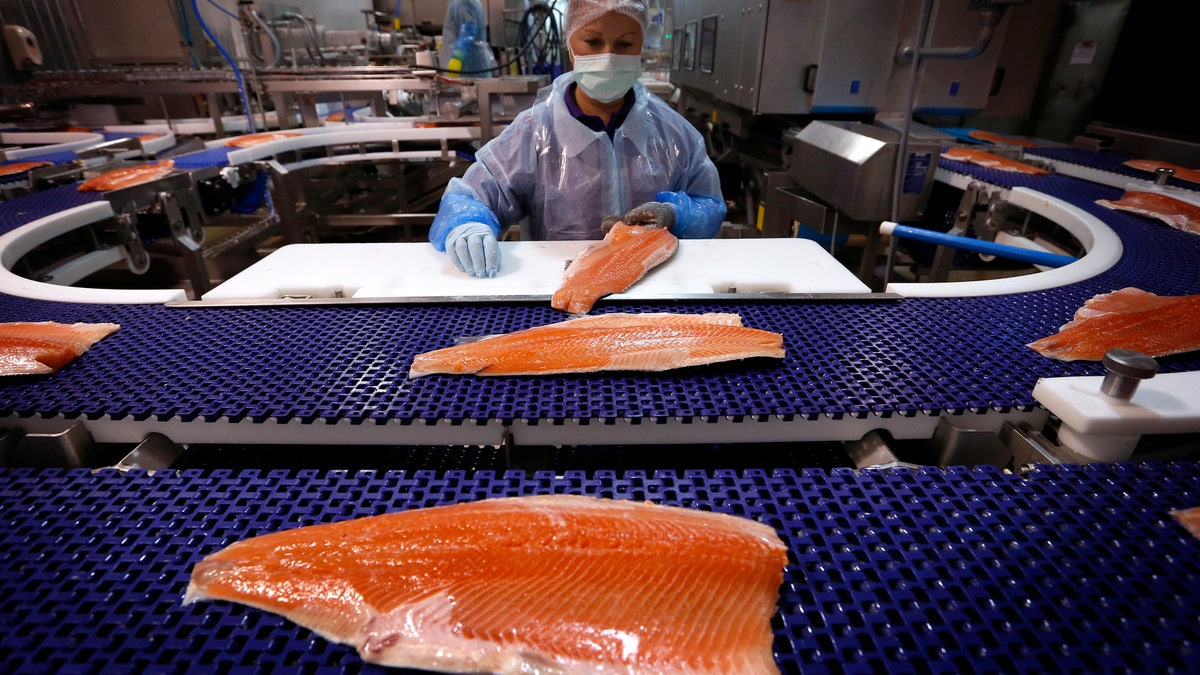
The FDA for the first time has approved the sale of genetically modified salmon. In this photo, a worker inspects a Tasmanian salmon fillet at the processing plant in Australia. (© David Gray / Reuters,Reuters Picture Stream/MED)
The Food and Drug Administration has ruled that genetically engineered salmon are safe to eat, paving the way for the first altered animals to eventually reach supermarket shelves.
The decision Thursday ends a five-year battle waged by AquaBounty Technologies, Inc. to get approval to produce and market its salmon that has been shown to grow much faster than non-genetically modified, farm-raised Atlantic salmon. In a statement, the Massachusetts-based biotech company welcomed the decision but didn’t say when the first batches of fish would be sold commercially.
Related: Gold vs. salmon: Oregon miners blast ban on suction dredging
“AquAdvantage Salmon is a game-changer that brings healthy and nutritious food to consumers in an environmentally responsible manner without damaging the ocean and other marine habitats,” Ronald L. Stotish, the chief executive officer of AquaBounty, said. “Using land-based aquaculture systems, this rich source of protein and other nutrients can be farmed close to major consumer markets in a more sustainable manner.”
In its ruling, the FDA said that AquAdvantage Salmon met the ”statutory requirements for safety and effectiveness under the Federal Food, Drug, and Cosmetic Act,” including that the fish is safe to eat and that the rDNA construct - the piece of DNA that makes the salmon grow faster - is safe for the fish.
It also is requiring that the salmon be raised only in land-based, contained hatchery tanks in Canada and Panama, and specifically ruled that they cannot be “bred or raised” in the United States.
Related: Salmon fraud frequently occurs at restaurants, grocery stores, study finds
A 2012 FDA assessment found that development of the salmon was unlikely to cause any environmental harm. Still, the decision probably won't end a long-running debate over whether the fish are safe to eat and what impact, if any, they might have on other species of fish.
“I’ve never had any real concerns about the safety of these genetically engineered salmon as a food source. I see no reason to worry about human health effects and apparently neither does the FDA,” J. Andrew DeWoody, a professor of Genetics at the Purdue University, said in a statement.
“However, I’ve always had concerns about the potential environmental effects should these GE fish escape into the wild because of their potential impact on native gene pools,” he said. “That said, I was pleased to learn that the GE fish will be sterile, landlocked, and surrounded by multiple physical barriers. The onus now falls on AquaBounty to maintain their physical facilities and on regulatory agencies to continually monitor the integrity of these safety measures into the foreseeable future, because U.S. waters have been negatively impacted by other species (such as carp) that escaped from containment ponds."
Related: To label or not to label: What you need to know about GMO food
Joe Perry, former Chair of the European Food Safety Authority GMO Panel, also said he remained concerned about the salmon.
“There remain legitimate ecological concerns over the possible consequences if these GM salmon escape to the wild and reproduce, despite FDA assurances over containment and sterility, neither of which can be guaranteed,” he said in a statement.
William Muir, Dr. another professor at Purdue was much more positive, calling it “huge win-win for the environment, consumers, and the process."
“The scientific review is clear, there is no credible evidence that these fish are a risk to either human health or the environment,” he said in a statement. “In contrast, the current practice of using wild caught salmon as a food source is not sustainable, our oceans are over fished.”
It is unclear when the salmon would be sold in supermarkets anytime soon.
Last year, several large supermarket chains including Safeway responded to growing concerns from some environmental groups by issuing a statement saying they wouldn’t sell GMO salmon even if it was approved by the FDA.
A spokesman for Safeway did not immediately respond.
On Thursday, a food safety group, the Center for Food Safety, said it would sue to block the agency's approval. Calling the fish a “dangerous contaminant,” the group said the decision ignored “millions of Americans and more than 40 members of Congress who have expressed vocal opposition” to the fish.
“The review process by FDA was inadequate, failed to fully examine the likely impacts of the salmon’s introduction, and lacked a comprehensive analysis,” Andrew Kimbrell, executive director of Center for Food Safety, said in a statement. “This decision sets a dangerous precedent, lowering the standards of safety in this country. CFS will hold FDA to their obligations to the American people.”
